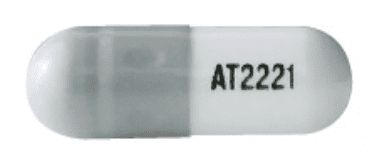Opfolda and Alcohol/Food Interactions
There is 1 alcohol/food/lifestyle interaction with Opfolda (miglustat).
Miglustat Food/Lifestyle
Moderate Food Interaction
ADJUST DOSING INTERVAL: Coadministration of miglustat with food may result in delayed absorption and decreased maximum plasma concentration (Cmax) in patients. In healthy subjects, coadministration of miglustat (100 mg) with food resulted in a decrease in the rate of absorption. The Cmax was decreased by 36% and the time to reach Cmax was delayed by 2 hours. However, the systemic exposure (AUC) was only decreased by 14%, which was not found to be statistically significant.
MONITOR: Administration of miglustat with high carbohydrate containing foods may increase the incidence of diarrhea and associated gastrointestinal complaints. The proposed mechanism is the inhibitory activity of miglustat on intestinal disaccharidases such as sucrase-isomaltase in the gastrointestinal tract, reducing absorption of dietary disaccharides in the small intestine and resulting in osmotic diarrhea. In clinical studies, diarrhea was observed in more than 80% of patients on miglustat therapy.
MANAGEMENT: The manufacturer of the miglustat formulation (brand name Opfolda) indicated for use in combination with cipaglucosidase alfa recommends separating miglustat from food and beverages (except for the unsweetened beverage used to swallow the capsule) by at least 2 hours before and after administration. Examples of unsweetened beverages include water, tea, or coffee with no cream, sugar, or sweeteners. The manufacturers of other miglustat formulations (e.g., brand names Zavesca, Yargesa) advise that they can be given with or without food. However, an individualized modification of the patient's diet (e.g., reduction of sucrose, lactose, and other carbohydrate intake), use of anti-diarrheal medications, taking the medication between meals and/or temporary dosage reduction may be required if diarrhea and/or other gastrointestinal events occur. Further evaluation for an underlying gastrointestinal issue should be considered if these adverse events persist irrespective of intervention. Consult the manufacturer's product labeling for additional information.
References (6)
- (2023) "Product Information. Pombiliti (cipaglucosidase alfa)." Amicus Therapeutics U.S., Inc.
- (2023) "Product Information. Opfolda (migLUstat)." Amicus Therapeutics U.S., Inc.
- (2022) "Product Information. Zavesca (migLUstat)." Actelion Pharmaceuticals US Inc
- (2023) "Product Information. Opfolda (miglustat)." Amicus Therapeutics UK Operations Ltd
- (2023) "Product Information. Miglustat (miglustat)." Flynn Pharma Ltd
- (2023) "Product Information. Yargesa (miglustat)." Piramal Critical Care Ltd
Switch to consumer interaction data
Opfolda drug interactions
There is 1 drug interaction with Opfolda (miglustat).
Opfolda disease interactions
There are 4 disease interactions with Opfolda (miglustat) which include:
More about Opfolda (miglustat)
- Opfolda consumer information
- Check interactions
- Compare alternatives
- Pricing & coupons
- Drug images
- Side effects
- Dosage information
- During pregnancy
- FDA approval history
- Drug class: miscellaneous metabolic agents
- Breastfeeding
- En español
Related treatment guides
Drug Interaction Classification
| Highly clinically significant. Avoid combinations; the risk of the interaction outweighs the benefit. | |
| Moderately clinically significant. Usually avoid combinations; use it only under special circumstances. | |
| Minimally clinically significant. Minimize risk; assess risk and consider an alternative drug, take steps to circumvent the interaction risk and/or institute a monitoring plan. | |
| No interaction information available. |
See also:
Further information
Always consult your healthcare provider to ensure the information displayed on this page applies to your personal circumstances.


